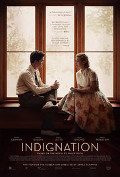
Directed by
James Schamus
110 minutes
Rated M
Reviewed by
Sharon Hurst

Indignation
Synopsis: Marcus Messner (Logan Lerman) leaves his strict working class Jewish family in New Jersey to attend a Christian university in Ohio. He studies hard to avoid being drafted into the Korean War and also falls for the gorgeous Olivia Hutton (Sarah Gadon) who is far more sexually precocious than he. Whilst inexperienced and insecure in sexual matters, Marcus questions the hidebound traditions of the college and society in general in vigorous debates with the college's conservative dean (Tracey Letts) as they discuss his life and future.
Based upon a Phillip Roth novel about 1950s under-grad college life, this directorial debut feature from James Schamus, best known for his work as a screenwriter for Ang Lee, feels vaguely irrelevant to our modern world. Yet with its intense and credible performances and incisive and thought-provoking dialogue, something which is rare in American film these days, it is nevertheless compelling
One quite unforgettable scene has a lengthy exchange between the dean and Marcus over what the the former sees as Marcus’s lack of spiritual direction. The dean is smug, even belligerent in defending his Christian values while the young man, who is determined to abjure all religion, holds his own admirably and, as the film’s title has it, with righteous indignation. The issues raised underscore the repressiveness of the 1950s with its adherence to traditions that today seem almost antediluvian.
As one would expect from Roth, sexual mores and repression play a prominent role in this story and the script deftly explores the biased attitudes which condemn a sexually precocious young woman like Olivia while at the same time condoning young men’s promiscuity (this is one convention that probably still has resonance in today’s world). Also typical of Roth, Jewishness, in particular the aspects of Marcus’ life that are defined by his Jewish upbringing, is also an issue. He is desperate to escape his father who is neurotically protective of Marcus, having had much of his family wiped out in the Holocaust, whilst both the young man’s parents are opposed to his dating a shiksa.
The narrative arc is an interesting one, opening with a young soldier on the battlefield, and a voice-over reflecting on the issue of causality and the decisions one makes in life. It is not until the film’s closing scenes that we realize the significance of this.
Want something different?





